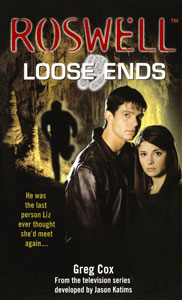After Melinda Metz’s 10-book YA series “Roswell High” (1998-2000) handed the baton to the TV series “Roswell” in 1999, Jason Katims and his writing team took the teens in a different direction from the books. So when the book line returned in May 2001 with Greg Cox’s “Loose Ends,” it was of course a tie-in with the TV series. Written as Season 2 was airing, and hitting bookshelves during the season’s homestretch (which is also when it takes place), “Loose Ends” became the first of 11 novels that fill in gaps and ultimately take the story beyond the end of the TV series.
The books get off to an inauspicious start. Cox’s bio touts him as “a huge ‘Roswell’ fan,” and his generally accurate characterizations of Liz, Max, Maria, Michael, Isabel and Alex support this. But I also suspect he was a handcuffed “Roswell” fan, because “Loose Ends” suffers from the same problem as a lot of “Buffy” Season 3 novels. “Roswell” Season 2 is so rife with relationship upheaval that even the staff writers probably needed a scorecard, and it’s darn-near impossible for tie-in authors to capture relationship nuances when they’re not privy to the TV show’s plans.
Cox vaguely hints at recent troubles, but the three core couples are intact during this book’s events, something that doesn’t line up with the TV show’s timeline. Most off point is Isabel-and-Alex. In Season 2, they become a genuine item at the point when Alex gains confidence, right before his death. But here, Alex is his old awkward self yet also holding hands with Iz.
I can’t argue with “Loose Ends’ ” premise. Cox – writing in a YA style that’s halfway between Metz’s approach and that of the TV show — takes the gang to perhaps the second-most-famous spot in New Mexico, the Carlsbad Caverns, for a weekend of relaxation. In the gift shop, Liz spots the man who accidentally shot her in the Crashdown Café in the pilot episode. The man, who we learn is named Joe Morton (apologies to the “T2” actor, I’m sure), likewise recognizes Liz.
From this point forward, Liz and Max are out of character, but this isn’t a failure by Cox; it’s purposeful. Since Liz couldn’t tell anyone she was shot (because she officially was not), her PTSD from the event got postponed; now it has been triggered. As is Max’s PTSD, since he’s connected to the girl he healed. In Liz, it manifests as fear like we’ve never seen from her; in Max, as anger.
Max behaves like Season 1 Michael, wanting to track down and kill Morton. Like he’s filling Max’s vacated spot on the game board, Michael becomes the voice of reason who tells his pod-brother to take a deep breath before he kills in cold blood.
Cox does his best writing with Isabel, who flirts with an Air Force pilot named David Ramirez (coincidentally the same last name as her Season 3 husband, Jesse). Ramirez is being blackmailed by Morton – in an arguable oversight, Cox doesn’t tell us how – into removing alien artifacts from an Air Force base and selling them to Morton. Isabel uses her hot-girl wiles to get information out of Ramirez, and later her dream-walking skills to get more info. Her dream-walking is more robust and, in the closing chapters, creepier than anything we see on TV.

Cox drops the ball with Morton, a one-dimensional psychopath. I admit that someone who fires off a gun in a crowded restaurant while arguing with a colleague shows signs of instability. But the author makes this moment the entirety of Morton’s personality. Open “Loose Ends” to any page and Morton is screaming and raging and possibly murdering someone. (Let’s just say his colleague from the Crashdown doesn’t get off as well as Liz does on that fateful day.)
Another problem is that, while Cox grasps the personalities and speaking rhythms of the Roswell teens, he doesn’t write them with nuance. Liz is terrified and Max is as determined, just as Morton is unhinged. The author gives us a lot of italicized glimpses at the teens’ thoughts, but these thoughts precisely match their behavior at the moment. Scratch the surface and you get more surface.
“Loose Ends” introduces a couple more alien artifacts to the collection, and amateur UFOlogists might appreciate the tinfoil-like material that always snaps back into pristine condition. Since this stuff comes from a tie-in novel, it’s not likely to play a role beyond this book. But then again, some artifacts in the proper TV narrative get set aside too.
This is an early effort in Cox’s career, which – along with the challenge of squeezing it into the Season 2 timeline – might explain why it’s relatively tame. He would go on to do better work in the “Buffy,” “X-Files” and “Terminator” franchises. The “Roswell” book line likewise gets better after this.

